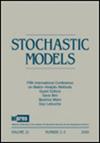多尺度基础设施增强动态网络中的连接间隔
IF 0.7
4区 数学
Q4 STATISTICS & PROBABILITY
引用次数: 0
摘要
本文章由计算机程序翻译,如有差异,请以英文原文为准。
Connection intervals in multi-scale infrastructure-augmented dynamic networks
Abstract We consider a hybrid spatial communication system in which mobile nodes can connect to static sinks in a bounded number of intermediate relaying hops. We describe the distribution of the connection intervals of a typical mobile node, i.e., the intervals of uninterrupted connection to the family of sinks. This is achieved in the limit of many hops, sparse sinks and growing time horizons. We identify three regimes reflecting various degrees of sink densities. Namely, (1) a regime of dense sinks, in which the limit is deterministic and given as an expectation with respect to percolation clusters, (2) a regime of sparse sinks, in which the limit depends on a random number of reachable sinks, and (3) an intermediate critical regime.
求助全文
通过发布文献求助,成功后即可免费获取论文全文。
去求助
来源期刊

Stochastic Models
数学-统计学与概率论
CiteScore
1.30
自引率
14.30%
发文量
42
审稿时长
>12 weeks
期刊介绍:
Stochastic Models publishes papers discussing the theory and applications of probability as they arise in the modeling of phenomena in the natural sciences, social sciences and technology. It presents novel contributions to mathematical theory, using structural, analytical, algorithmic or experimental approaches. In an interdisciplinary context, it discusses practical applications of stochastic models to diverse areas such as biology, computer science, telecommunications modeling, inventories and dams, reliability, storage, queueing theory, mathematical finance and operations research.
 求助内容:
求助内容: 应助结果提醒方式:
应助结果提醒方式:


